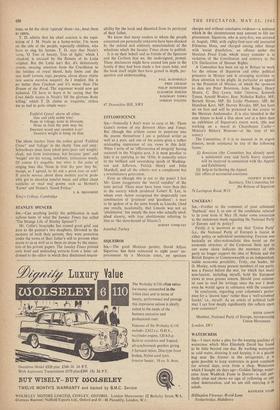SIR,—Naturally I don't want to carp at Mr. Thom Gunn's
review of my Between Mars and Venus. But (though this seldom seems to penetrate into the poems themselves) I am a political writer as well as a poet, and one of his points gives a rather misleading impression of my views in this field. When I write of an 'efflorescence of integrity' having occurred in the Virginia past, it is most peculiar to take it as applying to the 1850s. It naturally refers to the brilliant and astonishing epoch of Washing- ton and Jefferson, Patrick Henry and John Marshall, and all the others—not a complacent but a revolutionary generation.
Even so (though this is not to the point) I feel Mr. Gunn exaggerates the 'moral vapidity' of the later period. There must have been more than this in the society which produced Robert E. Lee, in whom even Acton recognised the desperately rare combination of 'greatness' and 'goodness': a man to be spoken of in the same breath as Lincoln. (And one recalls, incidentally, that Lincoln was not an 'abolitionist,' but simply the man who actually abol- iihed slavery, with true abolitionists referring to him as 'the slave-hound of Illinois.') ROBERT CONQUEST






































 Previous page
Previous page